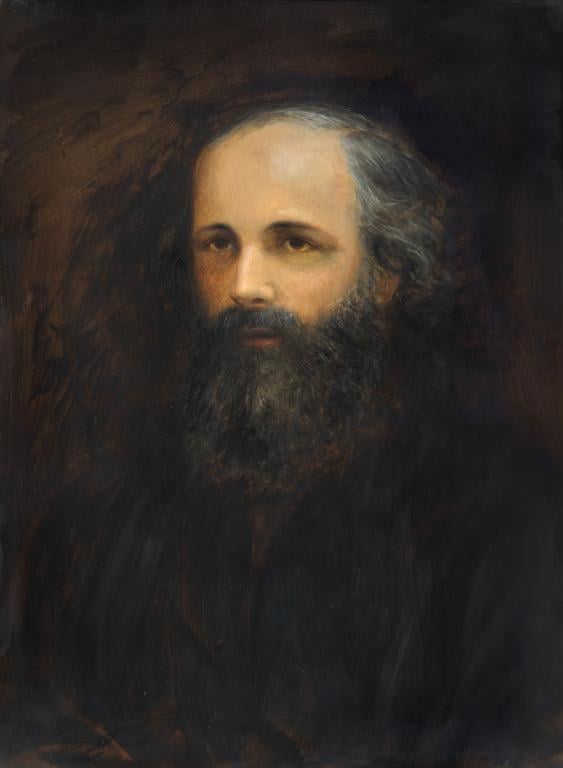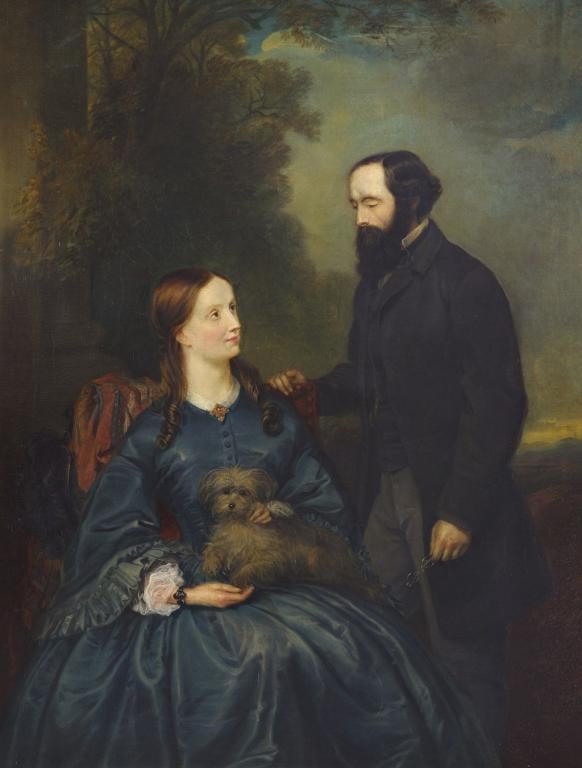
(Wikimedia Commons public domain image)
We drove through Aberdeen today — we’ve been in Aberdeenshire pretty much the whole time that we’ve been in Scotland — and it got me to thinking about the great James Clerk Maxwell (1831-1879), who was a Scot — born in Edinburgh — and who was affiliated for a few years with the University of Aberdeen. I make no claim of originality for what follows. I’ve simply culled some things from the Wikipedia article on Maxwell that interested me, as well as one or two other places:
The list of his achievements is stunning, and they are commonly ranked with those of Isaac Newton and Albert Einstein. In fact, in one sizable poll of prominent modern physicists, Maxwell was voted the third greatest physicist of all time, behind only those two. He is generally regarded as the most influential nineteenth-century physicist on the physics of the twentieth century.
He is credited, for example, with the creation of the classical theory of electromagnetic radiation, the first theory to describe electricity, magnetism, and light as different manifestations of the same phenomenon. In fact, his equations for electromagnetism have been termed the “second great unification in physics” — the first one having been achieved by Isaac Newton. In 1865, Maxwell demonstrated that electric and magnetic fields travel through space as waves that move at the speed of light and he proposed that light is an undulation in the same medium that is the cause of electric and magnetic phenomena. This idea led him to predict the existence of radio waves.
Maxwell’s discoveries helped to create modern physics, laying the foundation for such theories as special relativity and quantum mechanics — and they undergird not only radio, but television, smartphones, and the Internet. On the centennial of his birth, Einstein is reported to have described Maxwell’s work as the “most profound and the most fruitful that physics has experienced since the time of Newton.” When, during a visit to the University of Cambridge in 1922, Einstein was told by his host that he had achieved great things because he stood on the shoulders of Isaac Newton (who was affiliated for much of his life with Cambridge), Einstein replied: “No I don’t. I stand on the shoulders of Maxwell.” (Fortunately, Maxwell too was significantly associated with Cambridge.) In fact, I’ve read somewhere that, as an inspiration, Einstein kept a portrait of Maxwell on his wall.
It’s not necessary to be a physicist, or even to understand precisely what all of the items on Wikipedia’s list of what James Clerk Maxwell is “known for” are — I certainly don’t! — in order to sense from them the depth and the range of his contributions:
(See, too, Wikipedia’s “List of things named after James Clerk Maxwell.”)
In addition, Maxwell is regarded as one of the founders of electrical engineering. He did extensive work on color vision. He is also famous for having created the first durable color photograph, in 1861, for developments on the regulation of steam engines, and for his foundational work on the analysis of the structural rigidity of the kinds of rod-and-joint frameworks, or trusses, that are used (among other places) in bridges. He is also the person who proved that the rings of Saturn are made of small particles.

And yet, amazingly (and sadly), James Clerk Maxwell’s life ended much too early. He died in Cambridge on 5 November 1879 at the age of only 48, of abdominal cancer. It was the same type of cancer that had taken his mother, at approximately the same age. What more might he have achieved had he lived a normal lifespan?
Happily, Maxwell didn’t die without the comfort of a strong religious faith. He was an evangelical Presbyterian and even, in his later years, an Elder in the Church of Scotland. As a child, he had attended both Episcopalian services (his mother’s denomination) and those of the Church of Scotland (his father’s denomination), and he experienced an evangelical conversion in April of 1853, while at Cambridge (where he had gone to continue his studies after the University of Edinburgh).
And that conversion plainly endured. Evidently, many letters to his wife, the former Katherine Dewar, survive in which Maxwell discusses biblical passages that they were reading through together.
James Clerk Maxwell was appointed the first Cavendish Professor of Experimental Physics at Cambridge in 1871. There, in 1874, he created the legendary Cavendish Laboratory, which has (as of today) generated thirty Nobel Prizes. (Had Maxwell himself not died prematurely, sixteen years before the first Nobel Prize in Physics was awarded, the Nobel committee would certainly have honored him with it.) An expression of Maxwell’s personal faith can probably be seen in the inscription (Psalm 111:2, or 110:2 in the Clementine Vulgate) that was inscribed above the doors of the original building that housed the Cavendish: Magna opera Domini exquisita in omnes voluntates ejus: “The works of the Lord are great, sought out of all them that have pleasure therein.”
The minister who visited Maxwell regularly during the last weeks of his life was astonished at his lucidity and at the immense power and scope of his memory, but commented more particularly that
his illness drew out the whole heart and soul and spirit of the man: his firm and undoubting faith in the Incarnation and all its results; in the full sufficiency of the Atonement; in the work of the Holy Spirit. He had gauged and fathomed all the schemes and systems of philosophy, and had found them utterly empty and unsatisfying — “unworkable” was his own word about them — and he turned with simple faith to the Gospel of the Saviour.
As his death drew near, Maxwell told a Cambridge colleague that
I have been thinking how very gently I have always been dealt with. I have never had a violent shove all my life. The only desire which I can have is like David to serve my own generation by the will of God, and then fall asleep.
Posted from Stonehaven, Aberdeenshire, Scotland













